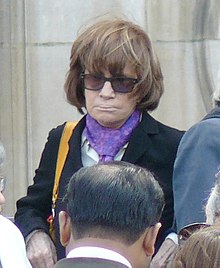Nadine Marquand
| Nadine Trintignant | |
|---|---|

Trintignant in 2010
|
|
| Born |
Nadine Marquand November 11, 1934 Nice, France |
| Nationality | French |
| Occupation | Film director, screenwriter, producer, editor, novelist |
| Spouse(s) |
Jean-Louis Trintignant (m. 1998; d. 2010) |
| Children |
|
Jean-Louis Trintignant
(m. 1960; div. 1976)
Nadine Trintignant (born 11 November 1934, Nice, France) is a French film director, producer, editor, screenwriter, and novelist. She is known for making films that surround the topic of family and relationships, such as Ça n'arrive qu'aux autres and L'été prochain. Her film Mon amour, mon amour was nominated for the Palme d'or at the 1967 Cannes Film Festival.
A native of Nice, Nadine Trintignant was born as Nadine Marquand on November 11, 1934. She is the sister of late actors Christian Marquand and Serge Marquand. In 1960, she married French actor Jean-Louis Trintignant, who had already starred in several of her early films. The couple had three children: a daughter, actress Marie Trintignant; another daughter, Pauline; and a son, actor and screenwriter Vincent Trintignant-Corneau. They remained together until their separation in 1976. Following their split, Trintignant started a relationship with French director Alain Corneau, who later became the adoptive father of her children Marie and Vincent. Trintignant and Corneau lived together for 37 years until his death in 2010.
Trintignant has suffered the loss of two of her three children. In 1970, her nine-month-old daughter Pauline died of crib death, and in 2003, her older daughter Marie died from injuries inflicted by her boyfriend, French musician Bertrand Cantat, during a domestic dispute.
In her films, Trintignant has focused greatly on the topics of family and relationships, often borrowing from events of her own life. Much of her work took place during the 1970s, which was a time of great advancement for woman filmmakers in France. Trintignant's interest in feminist issues and the perils of the heterosexual couple can be seen in many of her films, such as Mon amour, Mon amour (1967), or Le voyage des noces (1976). However, her identity as a feminist was not limited to her filmmaking. In 1971, she placed her name on the Manifesto of the 343, published in the French magazine Le Nouvel Observateur. The article was signed by 343 women including Trintignant who admitted to having abortions in order to raise awareness of female reproductive rights.
...
Wikipedia
